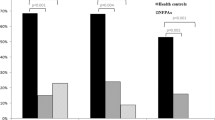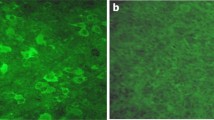Abstract
Previous case reports and retrospective studies suggest that pituitary dysfunction may occur after acute bacterial or viral meningitis. In this prospective study we assessed the pituitary functions, lipid profile and anthropometric measures in adults with acute bacterial or viral meningitis. Moreover, in order to investigate whether autoimmune mechanisms could play a role in the pathogenesis of acute meningitis-induced hypopituitarism we also investigated the anti-pituitary antibodies (APA) and anti-hypothalamus antibodies (AHA) prospectively. Sixteen patients (10 males, 6 females; mean ± SD age 40.9 ± 15.9) with acute infectious meningitis were included and the patients were evaluated in the acute phase, and at 6 and 12 months after the acute meningitis. In the acute phase 18.7% of the patients had GH deficiency, 12.5% had ACTH and FSH/LH deficiencies. At 12 months after acute meningitis 6 of 14 patients (42.8%) had GH deficiency, 1 of 14 patients (7.1%) had ACTH and FSH/LH deficiencies. Two of 14 patients (14.3%) had combined hormone deficiencies and four patients (28.6%) had isolated hormone deficiencies at 12 months. Four of 9 (44.4%) hormone deficiencies at 6 months were recovered at 12 months, and 3 of 8 (37.5%) hormone deficiencies at 12 months were new-onset hormone deficiencies. At 12 months there were significant negative correlations between IGF-I level vs. LDL-C, and IGF-I level vs. total cholesterol. The frequency of AHA and APA positivity was substantially high, ranging from 35 to 50% of the patients throughout the 12 months period. However there were no significant correlations between AHA or APA positivity and hypopituitarism. The risk of hypopituitarism, GH deficiency in particular, is substantially high in the acute phase, after 6 and 12 months of the acute infectious meningitis. Moreover we found that 6th month after meningitis is too early to make a decision for pituitary dysfunction and these patients should be screened for at least 12 months. In addition, the occurrence of AHA and APA positivity due to acute infectious meningitis was demonstrated for the first time. Further longer-term prospective investigations need to be carried out on a larger cohort of patients to understand the role of autoimmunity in the pathogenesis of late hypopituitarism after acute infectious meningitis.

Similar content being viewed by others
References
Haslam RH, Winternitz WW, Howieson J (1969) Selective hypopituitarism following tuberculous menigitis. Am J Dis Child 118:903–908
Lam KS, Sham MM, Tam SC, Ng MM, Ma HT (1993) Hypopituitarism after tuberculous meningitis in childhood. Ann Intern Med 118:701–706
Hagg E, Astrom L, Steen L (1978) Persistent hypothalamic-pituitary insufficiency following acute meningoencephalitis. A report of two cases. Acta Med Scand 203:231–235
Jew K, Piziak V, Gilliland PF, Hurley DL (1984) Meningoencephalitis complicated by pituitary insufficiency and a spontaneously resolving suprasellar mass. Neurosurgery 14:567–569
Kupari M, Pelkonen R, Valtonen V (1980) Post-encephalitic hypothalamic-pituitary insufficiency. Acta Endocrinol (Copenh) 94:433–438
Lichtenstein MJ, Tilley WS, Sandler MP (1982) The syndrome of hypothalamic hypopituitarism complicating viral meningoencephalitis. J Endocrinol Invest 5(2):111–115
Lynch C, Fish M (2007) Bacterial meningitis resulting in visual impairment and panhypopituitarism. Br J Hosp Med (Lond) 68:272
Muraoka A, Ogura M, Miyamoto K (1989) A case of empty sella syndrome with panhypopituitarism following acute meningoencephalitis. Nippon Naika Gakkai Zasshi 78:684–685
Pai KG, Rubin HM, Wedemeyer PP, Linarelli LG (1976) Hypothalamic-pituitary dysfunction following group B beta hemolytic streptococcal meningitis in a neonate. J Pediatr 88:289–291
Schaefer S, Boegershausen N, Meyer S, Ivan D, Schepelmann K, Kann PH (2008) Hypothalamic-pituitary insufficiency following infectious diseases of the central nervous system. Eur J Endocrinol 158:3–9
Tanriverdi F, Alp E, Demiraslan H, Dokmetas HS, Unluhizarci K, Doganay M, Casanueva FF, Kelestimur F (2008) Investigation of pituitary functions in patients with acute meningitis: a pilot study. J Endocrinol Invest 31:489–491
Tsiakalos A, Xynos ID, Sipsas NV, Kaltsas G (2010) Pituitary insufficiency after infectious meningitis: a prospective study. J Clin Endocrinol Metab 95:3277–3281
Tunkel AR, Scheld WM (2005) Acute meningitis. In: Mandell GL, Bennett JE, Dolin R (eds) Principles and practice of infectious disease. Elsevier Churchill Livingstone, Philadelphia, pp 1083–1126
Burke CW (1992) The pituitary megatest: outdated? Clin Endocrinol (Oxf) 36:133–134
Lamberts SW, de Herder WW, van der Lely AJ (1998) Pituitary insufficiency. Lancet 352:127–134
Molitch ME, Clemmons DR, Malozowski S, Merriam GR, Vance ML (2011) Evaluation and treatment of adult growth hormone deficiency: an Endocrine Society clinical practice guideline. J Clin Endocrinol Metab 96:1587–1609
Tanriverdi F, Unluhizarci K, Coksevim B, Selcuklu A, Casanueva FF, Kelestimur F (2007) Kickboxing sport as a new cause of traumatic brain injury-mediated hypopituitarism. Clin Endocrinol (Oxf) 66:360–366
Friedewald WT, Levy RI, Fredrickson DS (1972) Estimation of the concentration of low-density lipoprotein cholesterol in plasma, without use of the preparative ultracentrifuge. Clin Chem 18:499–502
Tanriverdi F, Kocyigit I, Unluhizarci K, Casanueva FF, Kelestimur F (2008) Body composition, serum IGF-I and leptin level changes in amateur boxers: retired boxers have risk factors for cardiovascular disorders. Obes Metab 4:118–123
De Bellis A, Kelestimur F, Sinisi AA, Bellastella G, Tanriverdi F, Unluhizarci K, Bizzarro A, Bellastella A (2008) Anti-hypothalamus and anti-pituitary antibodies may contribute to perpetuate the hypopituitarism in patients with Sheehan’s syndrome. Eur J Endocrinol 158:147–152
Bellastella G, Rotondi M, Pane E, Dello Iacovo A, Pirali B, Dalla Mora L, Falorni A, Sinisi AA, Bizzarro A, Colao A, Chiovato L, De Bellis A (2010) Predictive role of the immunostaining pattern of immunofluorescence and the titers of antipituitary antibodies at presentation for the occurrence of autoimmune hypopituitarism in patients with autoimmune polyendocrine syndromes over a five-year follow-up. J Clin Endocrinol Metab 95:3750–3757
Gomez JM, Espadero RM, Escobar-Jimenez F, Hawkins F, Pico A, Herrera-Pombo JL, Vilardell E, Duran A, Mesa J, Faure E, Sanmarti A (2002) Growth hormone release after glucagon as a reliable test of growth hormone assessment in adults. Clin Endocrinol (Oxf) 56:329–334
Karaca Z, Lale A, Tanriverdi F, Kula M, Unluhizarci K, Kelestimur F (2011) The comparison of low and standard dose ACTH and glucagon stimulation tests in the evaluation of hypothalamo-pituitary-adrenal axis in healthy adults. Pituitary14:134–140
Tanriverdi F, Senyurek H, Unluhizarci K, Selcuklu A, Casanueva FF, Kelestimur F (2006) High risk of hypopituitarism after traumatic brain injury: a prospective investigation of anterior pituitary function in the acute phase and 12 months after trauma. J Clin Endocrinol Metab 91:2105–2111
Levin AR (1959) Diabetes insipidus associated with tuberculous meningitis. Br Med J 2:1061–1063
Drury MI, O’Lochlainn S, Sweeney E (1968) Complication of tuberculous meningitis. Br Med J 1:842
Aimaretti G, Ambrosio MR, Di Somma C, Gasperi M, Cannavo S, Scaroni C, Fusco A, Del Monte P, De Menis E, Faustini-Fustini M, Grimaldi F, Logoluso F, Razzore P, Rovere S, Benvenga S, Uberti EC, De Marinis L, Lombardi G, Mantero F, Martino E, Giordano G, Ghigo E (2005) Residual pituitary function after brain injury-induced hypopituitarism: a prospective 12-month study. J Clin Endocrinol Metab 90:6085–6092
Schneider HJ, Schneider M, Saller B, Petersenn S, Uhr M, Husemann B, von Rosen F, Stalla GK (2006) Prevalence of anterior pituitary insufficiency 3 and 12 months after traumatic brain injury. Eur J Endocrinol 154:259–265
Kunitomi M, Wada J, Takahashi K (2002) Relationship between reduced serum IGF-I levels and accumulation of visceral fat in Japanese men. Int J Obes Relat Metab Disord 26:361–369
Tanriverdi F, Unluhizarci K, Kelestimur F (2006) Growth hormone replacement therapy in adults with growth hormone deficiency: benefits and cost-effectiveness. Expert Rev Pharmacoeconomics Outcomes Res 6:131–138
Amato G, Carella C, Fazio S, La Montagna G, Cittadini A, Sabatini D, Marciano-Mone C, Sacca L, Bellastella A (1993) Body composition, bone metabolism, and heart structure and function in growth hormone (GH)-deficient adults before and after GH replacement therapy at low doses. J Clin Endocrinol Metab 77:1671–1676
Tanriverdi F, Unluhizarci K, Kula M, Guven M, Bayram F, Kelestimur F (2005) Effects of 18-month of growth hormone (GH) replacement therapy in patients with Sheehan’s syndrome. Growth Horm IGF Res 15:231–237
Kasturi BS, Stein DG (2009) Traumatic brain injury causes long-term reduction in serum growth hormone and persistent astrocytosis in the cortico-hypothalamo-pituitary axis of adult male rats. J Neurotrauma 26:1315–1324
Tanriverdi F, Taheri S, Ulutabanca H, Caglayan AO, Ozkul Y, Dundar M, Selcuklu A, Unluhizarci K, Casanueva FF, Kelestimur F (2008) Apolipoprotein E3/E3 genotype decreases the risk of pituitary dysfunction after traumatic brain injury due to various causes: preliminary data. J Neurotrauma 25:1071–1077
Tanriverdi F, Unluhizarci K, Kelestrimur F (2010) Persistent neuroinflammation may be involved in the pathogenesis of traumatic brain injury (TBI)-induced hypopituitarism: potential genetic and autoimmune factors. J Neurotrauma 27:301–302
Tanriverdi F, De Bellis A, Bizzarro A, Sinisi AA, Bellastella G, Pane E, Bellastella A, Unluhizarci K, Selcuklu A, Casanueva FF, Kelestimur F (2008) Antipituitary antibodies after traumatic brain injury: is head trauma-induced pituitary dysfunction associated with autoimmunity? Eur J Endocrinol 159:7–13
Tanriverdi F, De Bellis A, Battaglia M, Bellastella G, Bizzarro A, Sinisi AA, Bellastella A, Unluhizarci K, Selcuklu A, Casanueva FF, Kelestimur F (2010) Investigation of antihypothalamus and antipituitary antibodies in amateur boxers: is chronic repetitive head trauma-induced pituitary dysfunction associated with autoimmunity? Eur J Endocrinol 162:861–867
Acknowledgments
We gratefully acknowledge Mrs Nilgun Yildirim for her irreplaceable nursing assistance.
Conflict of interest
There is no conflict of interest that could be perceived as prejudicing the impartiality of the research reported.
Author information
Authors and Affiliations
Corresponding author
Additional information
F. Tanriverdi and A. De Bellis contributed equally to this work.
Rights and permissions
About this article
Cite this article
Tanriverdi, F., De Bellis, A., Teksahin, H. et al. Prospective investigation of pituitary functions in patients with acute infectious meningitis: is acute meningitis induced pituitary dysfunction associated with autoimmunity?. Pituitary 15, 579–588 (2012). https://doi.org/10.1007/s11102-011-0371-7
Published:
Issue Date:
DOI: https://doi.org/10.1007/s11102-011-0371-7




